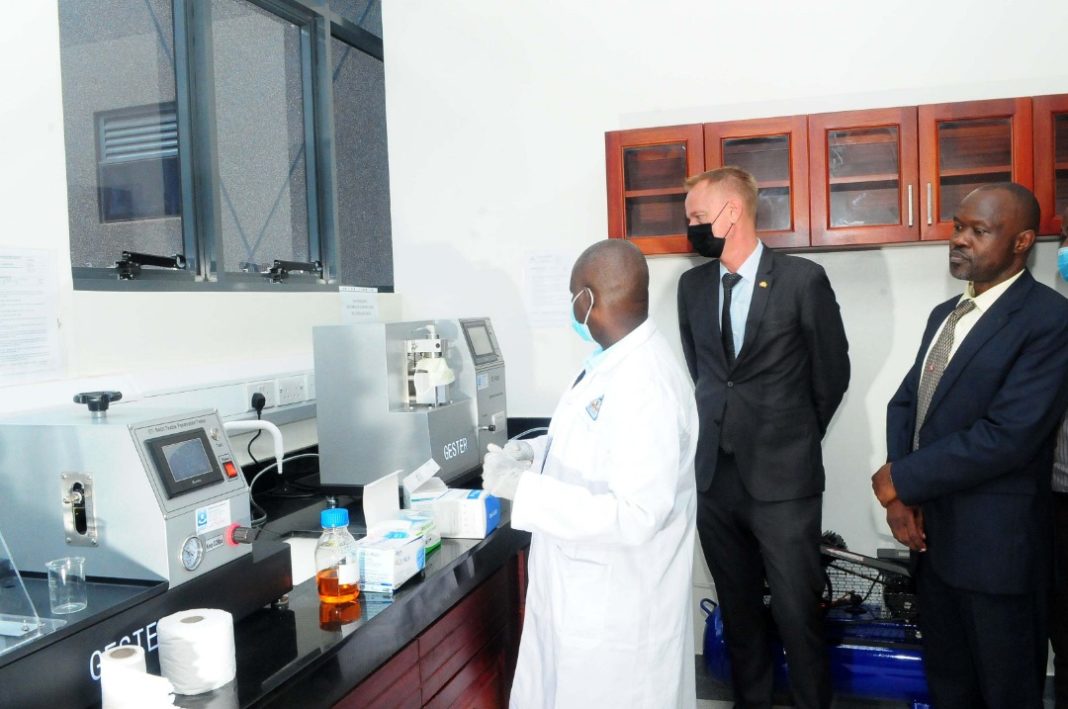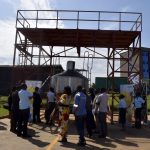The Uganda National Bureau of Standards (UNBS) is set to decentralise its laboratory testing services to its Regional Offices in Mbarara, Gulu and Mbale following a boost in Laboratory Testing Equipment donated by Trade Mark East Africa (TMEA) with support from the Danish Government.
During the official launch of laboratory equipment used for testing of products geared towards fighting against COVID-19, the Danish Ambassador to Uganda, H.E Nicolaj A. Hejberg Petersen, said that Danida through TMEA is facilitating the decentralisation of the UNBS testing centres in three major cities of Mbarara, Gulu and Mbale by purchasing laboratory equipment worth USD 1,885,280 (approximately Shs 6.9 billion) to help take testing services closer to the people.
Laboratory testing is instrumental in; Securing export markets for Ugandan products by carrying out tests required by the International markets, testing locally manufactured products especially from SMEs to check their conformity with the quality standards, thus helping the manufacturers improve product quality and access market.
It also assists local manufacturers and researchers in product development by testing their samples to determine conformity during the development process and protecting consumers by testing products on the market (both imported and locally made) to ensure that they are safe for human consumption.
“Denmark is passionate about promoting private sector development in Uganda and the decentralisation of testing services will promote a conducive business environment, ensure improved quality of products and contribute to efficiency in UNBS’ service delivery,” H. E Nicolaj A. Hejberg Petersen added.
The UNBS Executive Director, Mr. David Livingstone Ebiru said that the decentralisation of UNBS laboratory testing services will support agro-industrialisation, the parish development model and reduce the cost of doing business which is in line with the UNBS mandate of facilitating trade and strengthening the economy of Uganda by assuring the quality of locally manufactured products to enhance their competitiveness for exports to the regional and international markets.
Mr. Ebiru added that decentralisation will also reduce the turnaround time for analysis of samples in support of the certification process of various products for easy market access.
The decentralisation of UNBS testing services means that in the near future, chemical and microbial analysis of identified commodities such as edible fats and oils, milk and milk products, fruits and vegetables, cereal and cereal products, fish, meat, honey and horticultural products, will be done at the Regional Offices.
This development was revealed during the official launch of another set of equipment worth USD 93,594 (approximately 340 million Shillings) used for testing Personal Protective Wear used in the fight against COVID-19, received from TMEA with support from the Danish Government, at the UNBS Headquarters in Bweyogerere.
The equipment received includes; Rapid Alcohol Analyser used for determination of alcohol content, pH meters used for determination of the pH levels; Differential Pressure tester for determination of breathability; Splash Resistance tester for determination of resistance to penetration and Bursting Strength Tester for determination of bursting pressure strength.
The above equipment are being used to test both locally manufactured and imported face masks (both medical and non-medical), surgical gowns, drapers, clean air suits, respirators, sanitisers, liquid detergents and other products such as alcoholic beverages which include spirits, vodka, gin, rum, beer, Kombucha and juices, soft drinks and textile materials, for conformity assessment which is in line with the UNBS mandate of consumer protection and strengthening the economy of Uganda by assuring the quality of locally manufactured products to enhance their competitiveness in regional and international markets.








